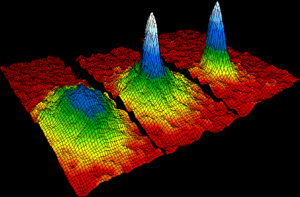 Image via Wikipedia
Image via Wikipedia
Science fiction fans (and, more importantly, critics and editors) refer to these blatant wish-granting elements and minerals as unobtainium, as they are unobtainable in the real world. Equivalent phrases include: Unattainium, wishalloy, buzzwordium, handwavium (for technical handwaving), and element 404 (as in Not Found).
I bring it up because: 14 years ago this week, the first pure Bose-Einstein condensate was synthesized. A BEC is an extremely weird state of matter with behaviors that cannot be fully explained by current science--including a propensity to spontaneously crawl out of containment vessels. Bose-Einstein condensates are often used as contemporary stand-ins for classic fictional unobtainium in modern science fiction stories, as it "sounds" more real and the author at least has the flimsy cover of "science doesn't understand it" to explain how BECs can turn raw matter into a Jovian mooncastle using only a souped-up inkjet printer (I'm looking at you, Charles Stross's Accelerando.) Plus, Bose-Einstein condensate is just fun to type, even if it sounds vaguely like the residue from a lightspeed subwoofer.
![Reblog this post [with Zemanta]](http://img.zemanta.com/reblog_e.png?x-id=843e800f-64f6-4bfa-a86d-f771ee486707)
Jay, I'm going to quibble here, as you used to invite people to do on your Geek Trivia newsletter. How can dilithium be more contemporary than scrith when Star Trek TOS predates Ringworld?
ReplyDelete